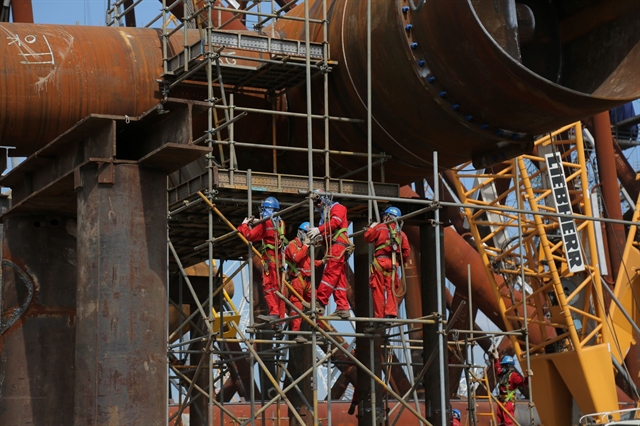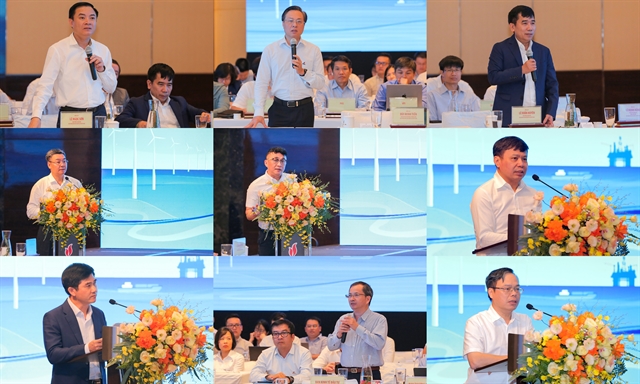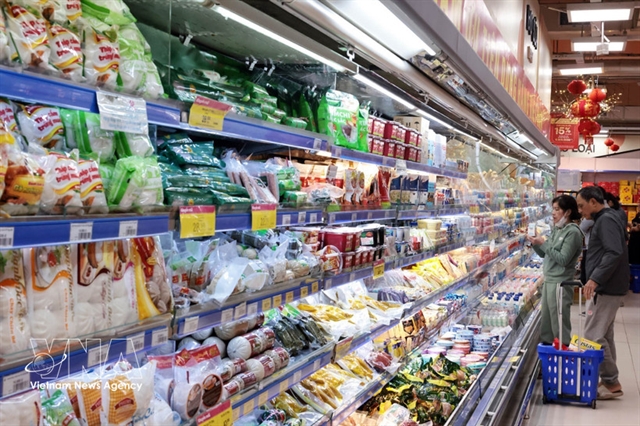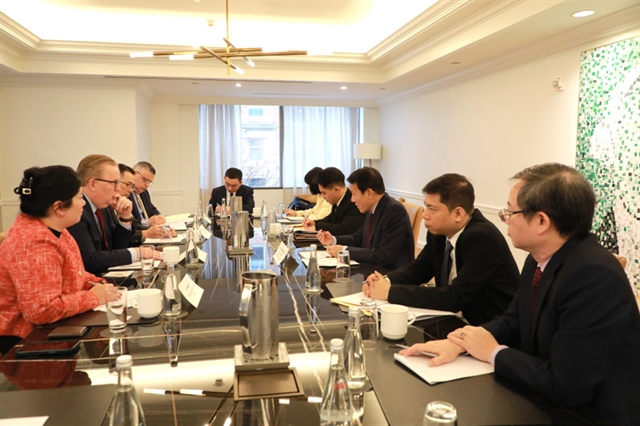 Economy
Economy


|
| PTSC employees at the construction site of the rig base. — Photo courtesy of Petrovietnam |
HÀ NỘI — The Vietnam Oil and Gas Group (Petrovietnam) has recently concluded its 2023 Oil and Gas Services Conference, a gathering marked by significant participation and meaningful discussions.
In his address, General Director Lê Mạnh Hùng underscored the pivotal role of the service sector, one of the five principal areas within the Group. This sector significantly contributes to both production and business endeavours, facilitating the broader progress of the Group.
In 2022, the Group's service revenue reached an impressive VNĐ199.8 trillion (US$8.4 billion), surpassing the year's target by over 78 per cent, constituting 34 per cent of the Group's consolidated revenue, and marking a remarkable 39 per cent increase from the previous year. This exemplifies the transformative role of oil and gas service activities within Petrovietnam's value chain.
Although the service sector has recorded substantial achievements, challenges remain. Issues such as the lack of a comprehensive master plan, concentration efforts, enhanced competitiveness, collaborative links and coordinated sharing within the service domain still necessitate resolution.
Hùng urged conference participants to prioritise collaborative exchange, dialogue, and collaborative problem-solving in order to advance the Group's service sector.
The conference's discussions and reports highlighted both challenges and opportunities.
The Group's service units continued to leverage their strengths and roles in service delivery. Meanwhile, member units displayed a steadfast commitment to maximising their contributions and optimising the utilisation of industry-provided services. The quality of service provision demonstrated a commendable upswing, capably meeting user demands and standards.
Predictions from respected economic and financial institutions forecasted a more challenging and unpredictable landscape for 2023 compared to the prior year. Rapid and unforeseeable fluctuations in economic factors, compounded by a globally uncertain political and macroeconomic scenario, posed potential threats to the Group's operations, business ventures, and investment plans.
To counteract these negative influences, conference participants advocated for an expanded focus on forming interconnected chains to optimise material resources and enhance investment outcomes, extending their oil and gas service provision beyond Petrovietnam's borders. This approach, they believed, would empower service units to proactively identify suitable collaboration avenues aligned with their capabilities, subsequently bolstering their competitive edge in servicing substantial upcoming Group projects.
Chairman of the Board of Members, Hoàng Quốc Vượng, expressed his acknowledgment and high regard for the insights shared during the conference. He emphasised the importance of decentralisation to enhance initiative within service units. Additionally, he suggested the establishment of an incentive mechanism to foster closer collaboration among service providers within the Group. These efforts, alongside the cultivation of corporate culture and proactive anticipation of energy transition trends, were urged to facilitate the swift implementation of digital transformation throughout the Group.

|
| Speakers at the conference. |
Concluding the event, General Director Lê Mạnh Hùng emphasised the steady growth of Petrovietnam's oil and gas service sector. He commended the sector for successfully meeting domestic and international oil and gas market demands, expanding its reach to provide technical services overseas.
He acknowledged that while there has been progress, challenges such as overlapping services and slow mutual development coordination between units persist. He called for a deeper synergy among the Group's components, moving beyond mere facilitation and into full-fledged implementation.
He emphasised the need to exploit the service sector's capacities and oil and gas technology strengths, especially in fields aligned with energy transformation trends. Notably, there's a burgeoning demand for engineering services driven by the shift toward renewables, particularly offshore wind. This presents both opportunities and challenges for Petrovietnam's service units in terms of growth and development.
Petrovietnam's overarching aim is to become a prominent energy industry group, requiring the oil and gas service sector to evolve into a comprehensive "industrial and energy service sector". This necessitates strategic adjustments, efficient asset utilisation, and enhanced inter-unit connectivity. The goal is to sustain the market share of traditional oil and gas services, ensuring economic efficiency while elevating service quality.
To achieve this, Hùng directed the organisational representative to restructure units within the oil and gas service domain, fortifying their pivotal role in connecting Group activities. Furthermore, efforts to formulate key product and service lists, refine internal management systems, and boost decentralised governance were encouraged, with a clear mandate for unit leaders to continually evaluate and propose value chain implementation.
He also called upon specialised departments and units to expedite research into investment strategies and facility development. Their focus should be on cultivating robust and proficient service units capable of competently handling Group projects and international market demands.
As part of the conference's framework, seven minutes and memoranda of understanding were signed between units in the Group, aimed at expanding implementation and bolstering the effectiveness of interconnected chains across the Group. — VNS




